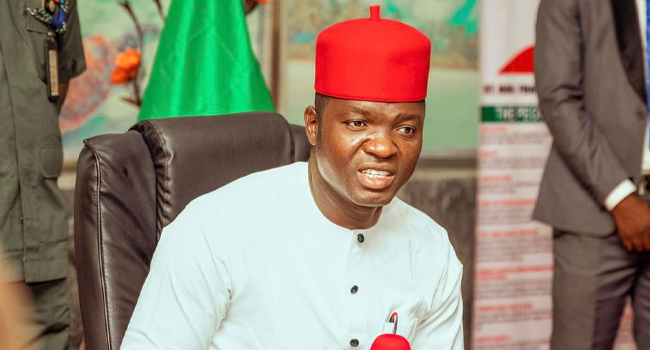Governor Francis Ogbonna Nwifuru on Tuesday presented a N884.868 billion budget proposal for the 2026 fiscal year to the Ebonyi State House of Assembly, describing it as the “Budget of Actualisation and Hope.”
Speaking at the State Assembly complex, Governor Nwifuru said the budget aims to accelerate infrastructure development, strengthen human capital, and consolidate reforms across key sectors, in line with his administration’s People’s Charter of Needs philosophy.
The proposed budget allocates ₦749.49 billion (84.7%) for capital expenditure and ₦135.37 billion for recurrent costs. According to the governor, the plan will drive industrialisation, deepen economic recovery, and improve the standard of living for Ebonyi residents.
Reflecting on the administration’s achievements, Nwifuru recalled the inherited debts and unsettled pensions left by previous governments, noting that thousands of pensioners have now received their long-awaited gratuities. “We restored not just their financial stability but their dignity,” he said, commending the Assembly for its legislative support.
Highlighting 2025 accomplishments, he revealed that over 5,000 residents benefitted from the state’s empowerment programmes, receiving financial support ranging from ₦1 million to ₦100 million for entrepreneurship, trading, and artisanal projects.
Vocational and agribusiness training has also equipped youths and women with life-changing skills. “We are building not just roads and schools, but resilient people empowered to be globally competitive,” he said.
On education, the governor announced landmark achievements including the establishment of the University of ICT, Oferekpe, offering over 20 accredited courses, and the commencement of the University of Aeronautic Engineering, Ezza, positioning Ebonyi as a rising hub in aviation technology.
READ ALSO: Sanwo-Olu Presents Proposed 2026 N4.2Tr Budget to Lagos Assembly
Other milestones include the construction of 43 model secondary schools equipped with ICT labs, libraries, and solar power, and the award of over 1,000 local and overseas postgraduate scholarships the largest in the state’s history.
Read Also
In health, Nwifuru highlighted free maternal care for pregnant women, improved emergency medical services with fully equipped ambulances, upgraded general hospitals, recruitment of additional health workers, and the revival of the drug revolving fund.
Agriculture and job creation remain key priorities, he said, noting the mechanisation of farming across the state’s 13 local government areas, distribution of fertilizers, and support for cooperative farmers.
Projects under construction include the Ebonyi Feed Mill and the revitalisation of Nkaliki Hatchery, expected to create 2,000 jobs.
Infrastructure development has also seen major progress. The governor cited the VANCO Flyover and Tunnel in Abakaliki, the completion of Iziogo Tunnel, ongoing works on Nwezenyi and Nwofe Junction flyovers, and the rehabilitation of township and rural roads and bridges across the state.
On security, Nwifuru praised law enforcement agencies for maintaining peace and noted that the demarcation of the Effium–Alioma boundary is underway to ensure lasting harmony. He also confirmed advancements on industrial projects including the Ebonyi Industrial City, the state-owned cement factory, and the reactivated Waste-to-Wealth Plant in Umuoghara.
Water infrastructure remains a priority, with key schemes such as Oferekpe, Abakaliki Lowlift, and Ezill revitalised, while new reservoirs and reticulation projects are underway in Iboko and Ivo.
The budget’s sectoral allocation assigns ₦137.37 billion (15.52%) to the Administrative Sector, ₦492.93 billion (55.71%) to the Economic Sector, ₦5.03 billion (0.57%) to Law and Justice, ₦1.56 billion (0.18%) to the Regional Sector, and ₦247.97 billion (28.02%) to the Social Sector.
Governor Nwifuru described the budget as a product of “determination, discipline, and sincerity,” despite national economic challenges, and urged lawmakers to give the Appropriation Bill accelerated consideration to ensure that every citizen feels the government’s impact.





